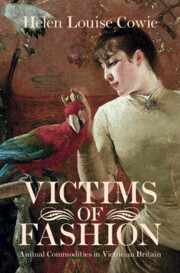Refine search
Actions for selected content:
13588 results in History of science and technology
5 - Ancestry Informative Markers
-
- Book:
- Understanding DNA Ancestry
- Published online:
- 05 March 2022
- Print publication:
- 04 November 2021, pp 41-49
-
- Chapter
- Export citation
Summary of Common Misunderstandings
-
- Book:
- Understanding DNA Ancestry
- Published online:
- 05 March 2022
- Print publication:
- 04 November 2021, pp 129-130
-
- Chapter
- Export citation
Dedication
-
- Book:
- Understanding DNA Ancestry
- Published online:
- 05 March 2022
- Print publication:
- 04 November 2021, pp ix-x
-
- Chapter
- Export citation
1 - Introduction
-
- Book:
- Understanding DNA Ancestry
- Published online:
- 05 March 2022
- Print publication:
- 04 November 2021, pp 1-7
-
- Chapter
-
- You have access
- HTML
- Export citation
5 - The End as a New Beginning
-
- Book:
- We Have Always Been Cyborgs
- Published by:
- Bristol University Press
- Published online:
- 30 April 2022
- Print publication:
- 04 November 2021, pp 185-187
-
- Chapter
- Export citation
2 - On a Silicon-based Transhumanism
-
- Book:
- We Have Always Been Cyborgs
- Published by:
- Bristol University Press
- Published online:
- 30 April 2022
- Print publication:
- 04 November 2021, pp 22-60
-
- Chapter
- Export citation
Contents
-
- Book:
- We Have Always Been Cyborgs
- Published by:
- Bristol University Press
- Published online:
- 30 April 2022
- Print publication:
- 04 November 2021, pp v-v
-
- Chapter
- Export citation
Index
-
- Book:
- We Have Always Been Cyborgs
- Published by:
- Bristol University Press
- Published online:
- 30 April 2022
- Print publication:
- 04 November 2021, pp 209-216
-
- Chapter
- Export citation
3 - What Our Genomes Tell Us about the Geographical Origins and Movements of Early Human Populations
-
- Book:
- Understanding DNA Ancestry
- Published online:
- 05 March 2022
- Print publication:
- 04 November 2021, pp 17-25
-
- Chapter
- Export citation
Index
-
- Book:
- Understanding DNA Ancestry
- Published online:
- 05 March 2022
- Print publication:
- 04 November 2021, pp 146-152
-
- Chapter
- Export citation

Victims of Fashion
-
- Published online:
- 29 October 2021
- Print publication:
- 18 November 2021
Adjusting to precarity: how and why the Roslin Institute forged a leading role for itself in international networks of pig genomics research
-
- Journal:
- The British Journal for the History of Science / Volume 54 / Issue 4 / December 2021
- Published online by Cambridge University Press:
- 12 October 2021, pp. 507-530
- Print publication:
- December 2021
-
- Article
-
- You have access
- Open access
- HTML
- Export citation
R.A. Fisher, eugenics, and the campaign for family allowances in interwar Britain
-
- Journal:
- The British Journal for the History of Science / Volume 54 / Issue 4 / December 2021
- Published online by Cambridge University Press:
- 11 October 2021, pp. 485-505
- Print publication:
- December 2021
-
- Article
- Export citation
Denis Papin's digester and its eighteenth-century European circulation
-
- Journal:
- The British Journal for the History of Science / Volume 54 / Issue 4 / December 2021
- Published online by Cambridge University Press:
- 11 October 2021, pp. 443-463
- Print publication:
- December 2021
-
- Article
- Export citation
‘Impossible to provide an accurate estimate’: the interested calculation of the Ottoman public debt, 1875–1881
-
- Journal:
- The British Journal for the History of Science / Volume 55 / Issue 4 / December 2022
- Published online by Cambridge University Press:
- 08 October 2021, pp. 477-493
- Print publication:
- December 2022
-
- Article
-
- You have access
- Open access
- HTML
- Export citation
List of figures and tables
-
- Book:
- The Next Welfare State?
- Published by:
- Bristol University Press
- Published online:
- 13 May 2022
- Print publication:
- 30 September 2021, pp viii-ix
-
- Chapter
- Export citation
Index
-
- Book:
- The Next Welfare State?
- Published by:
- Bristol University Press
- Published online:
- 13 May 2022
- Print publication:
- 30 September 2021, pp 156-162
-
- Chapter
- Export citation
Introduction
-
- Book:
- The Next Welfare State?
- Published by:
- Bristol University Press
- Published online:
- 13 May 2022
- Print publication:
- 30 September 2021, pp 1-10
-
- Chapter
- Export citation
Contents
-
- Book:
- The Next Welfare State?
- Published by:
- Bristol University Press
- Published online:
- 13 May 2022
- Print publication:
- 30 September 2021, pp vii-vii
-
- Chapter
- Export citation
3 - Back to the future, again
-
- Book:
- The Next Welfare State?
- Published by:
- Bristol University Press
- Published online:
- 13 May 2022
- Print publication:
- 30 September 2021, pp 63-88
-
- Chapter
- Export citation
